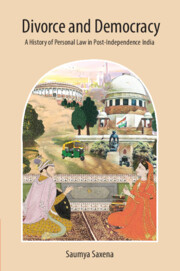Book contents
- Frontmatter
- Dedication
- Contents
- List of Figures
- Acknowledgements
- List of Abbreviations
- Introduction
- 1 Personal Law and the Making of Modern Religion, 1946–56
- 2 Committees, Codes, and Customs: Renegotiating Personal Law, 1957–69
- 3 Social Movements, National Emergency, and the Custody of the Constitution, 1967–79
- 4 Muslim Law, Hindu Nationalism, and Indian Secularisms, 1980–92
- 5 The Court in Context, 1992–2000s
- 6 From the Courtroom to the Courtyard: The Public Life of Personal Law, 2000–Present
- Conclusion
- Glossary
- Bibliography
- Index
Conclusion
Published online by Cambridge University Press: 20 May 2022
- Frontmatter
- Dedication
- Contents
- List of Figures
- Acknowledgements
- List of Abbreviations
- Introduction
- 1 Personal Law and the Making of Modern Religion, 1946–56
- 2 Committees, Codes, and Customs: Renegotiating Personal Law, 1957–69
- 3 Social Movements, National Emergency, and the Custody of the Constitution, 1967–79
- 4 Muslim Law, Hindu Nationalism, and Indian Secularisms, 1980–92
- 5 The Court in Context, 1992–2000s
- 6 From the Courtroom to the Courtyard: The Public Life of Personal Law, 2000–Present
- Conclusion
- Glossary
- Bibliography
- Index
Summary
We must not make a scarecrow of the law, setting it up to fear the birds of prey, And let it keep one shape, till custom make it their perch and not their terror.
—William Shakespeare, Measure for MeasureThe question of personal laws in India follows this Shakespearean logic as the state routed its engagement with family law through religion to exercise more significant and intimate control over citizens. But as it proceeded to write customs and religion into statutes, alternate authorities/movements emerged to usurp or to challenge the statutes of religious personal laws in India. Furthermore, the statute itself remained a scarecrow with little uniformity in its understanding and inefficient implementation. If one were to extend this Shakespearean metaphor, however, the ineffectual scarecrow provided a perch for the birds of prey (as patriarchy got written into statutes) but was more visible to the watchful farmer (the stakeholders) than before when her adversaries were camouflaged amidst the thickets. Women could rally against an unjust or an ill-interpreted religious statute, than build a critique of religion alone. The codification of personal laws thus achieved the unique feat of making the personal public. It politicized the domestic sphere and rendered religion amendable rather than purging it from public life. Not only did religion acquire characteristics of neutrality but the law also acquired the characteristics of religion.
The interconnectedness and, indeed, reliance of state power on religion, religious forums, and disagreements within the institutions of state rendered impossible the imputation of any will to the state itself. Thus, while the state's complicity in patriarchy and the stifling language of the law it generates has been well established in scholarship, the book traces the historical trajectory of negotiations with the law, offering a glimpse into India's democracy through a conversation over divorce.
Legislation did not tighten the grip of the state on personal law. Complex law-related processes, however, produced an awareness of differences, religious, caste, regional, or customary, which were in a constant state of calibration. This book aimed to capture the shifting meanings and interrelationship between law, religion, family, minority rights, and gender by tracing key developments in personal law in postcolonial Indian politics.
- Type
- Chapter
- Information
- Divorce and DemocracyA History of Personal Law in Post-Independence India, pp. 321 - 330Publisher: Cambridge University PressPrint publication year: 2022

